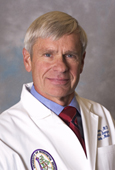Last updated: December 23, 2009
Edited by:
|
Summary rotator cuff tear Failure of the rotator cuff due to either tear or wear is the most common clinical problem of the shoulder, accounting for more than 4.5 million physician visits per year in the United States (evaluation of the weak shoulder). Failure of the cuff tendon may result from a major injury, but more commonly it results from age-related attrition of the tendons, typically starting with the undersurface of the anterior aspect of the supraspinatus. While it was once believed that rotator cuff tears were usually caused by impingement by the acromion and that acromioplasty was an important part of the treatment, recent experience has demonstrated that impingement is not the cause of rotator cuff tears in most cases. Acute rotator cuff tears, such as those resulting from a fall that causes weakness in a previously normal shoulder, can often be repaired surgically.Chronic rotator cuff tears may respond to mobilization and strengthening exercises (i.e. stiff shoulder exercises; weak shoulder exercises) and to physical therapy. If these exercises are not beneficial, consideration can be given to a surgery to smooth the area around the rotator cuff and to remove scar tissue (rotator cuff failure) Cortisone or steroid injections into the shoulder may temporarily relieve symptoms. Repeated cortisone or steroid injections may weaken the tendons, making them more likely to tear in the future. When arthritis accompanies a rotator cuff tear or in a condition known as rotator cuff tear arthropathy, it may be necessary to use special joint replacement implants to improve the comfort and function of the shoulder. If the rotator cuff is irreparable, the shoulder is arthritic, and if the shoulder is stable, a cuff tear arthropathy (CTA) prosthesis may be helpful. If the rotator cuff is irreparable, the shoulder is arthritic, and if the shoulder is unstable, a reverse, or reversed total shoulder prosthesis may be needed. Decisions about the best procedure for each individual patient need to be made by consultation with a surgeon experienced in complex shoulder reconstruction. 10 surgery questions for your surgeon before having surgery We have recently published a current concepts review of rotator cuff conditions in the New England Journal of Medicine Some of our other writings about the rotator cuff are listed below: Mack, L.A., Matsen III, F.A., Kilcoyne, R.F., Davies, P.K., and Sickler, M.A.: Ultrasound: US Evaluation of the Rotator Cuff. Radiology, 157:205-209, 1985. Mack, L.A., Nyberg, D.A., Matsen III, F.A.: Sonographic Evaluation of the Rotator Cuff., Radiologic Clin. North. Am., Vol.26(1):161-177, 1988. Mack, L.A., Nyberg, D.A., Kilcoyne, R.F., Harvey, D., and Matsen III, F.A., Sonography of the Post-Operative Shoulder. Am.J. Roentgenology, 150:1089-1094. 1988. Clark, J., Sidles, J.A., and Matsen III, F.A.: The Relationship of the Glenohumeral Joint Capsule to the Rotator Cuff. Clin. Orthop., 254:29-34, 1990. Harryman II, D.T., Mack, L.A., Wang, K.Y., Jackins, S.E., Richardson, M.L., and Matsen III, F.A.: Rotator Cuff Repair: Correlation of Functional Results With Cuff Integrity. J. Bone and Joint Surgery, 73A:982-989, 1991. Arntz, C.T., and Matsen III, F.A.: Surgical Management of Complex Irreparable Rotator Cuff Deficiencies. J. Arthroplasty, 6(4), 1991. Harryman II, D.T., Sidles, J.A., Harris, S., and Matsen III, F.A.: The Role of the Rotator Interval Capsule in Passive Motion and Stability of the Shoulder. J. Bone and Joint Surgery, 74A:53-66, 1992. Pearl, M.L., Jackins, S., Sidles, J.A., Lippitt, S.B., and Matsen III, F.A.: Humeroscapular Positions in a Shoulder Range of Motion Examination. J. Shoulder & Elbow Surg., 1(6):296-305, 1992. Arntz, C.T., Jackins, S., and Matsen III, F.A.: Prosthetic Replacement of the Shoulder for the Treatment of Defects in the Rotator Cuff and the Surface of the Glenohumeral Joint. J. Bone and Joint Surg., 75A(4):485-491, 1993. Harryman, D.T., Matsen III, F.A., and Sidles, J.A.: Arthroscopic Management of Refractory Shoulder Stiffness. J Arthroscopic and Related Surg., 13(1) 1997. Duckworth, D.G., Smith, K.L., Campbell, B., Matsen III, F.A.: Self-assessment questionnaires document substantial variability in the clinical expression of rotator cuff tears. J Shoulder Elbow Surg., 8(4):330-3, 1999. O'Kane, J.W., Jackins, S., Sidles, J.A., Smith, K.L., Matsen III, F.A.: Simple home program for frozen shoulder to improve patients' assessment of shoulder function and health status. J Am Board Fam Pract., 12(4):270-7, 1999. Viola, R. W, Boatright, K. C., Smith, K. L., Sidles, J. A., and Matsen, F.A.: Do shoulder patients insured by workers’ compensation present with worse self-assessed function and health status? J. Shoulder Elbow Surg., 9(5):368-72, 2000. Smith, K.L, Harryman II, D.T., Antoniou, J., Campbell, B., Sidles, J. A., and Matsen III, F.A.: A prospective multi-practice study of shoulder function and health status in patients with documented rotator cuff tears. J. Shoulder Elbow Surg., 9(5):395-402, 2000. Goldberg, B.A., Nowinski, R.J., and Matsen III, F.A.: Outcome of nonoperative management of full thickness rotator cuff tears. Clin Orthop, 382:99-107, 2001. Goldberg, B.A., Lippitt, S.B., and Matsen III, F.A.: Improvement in shoulder comfort and function after rotator cuff repair without acromioplasty. Clin. Orthop., 382:99-107, 2001. Harryman II, D.T., Hettrich, C., Smith, K.L., Campbell, B., Sidles, J.A., and Matsen III, F.A.: A prospective multipractice investigation of patients with full thickness rotator cuff tears: The importance of co-morbidities, surgeon, and other co-variables on self-assessed shoulder function and health status. J. Bone Joint Surg., 85A(4): 690-696, 2003. Churchill, R.S., Fehringer, E.V., Dubinsky, T.J., Matsen III, F.A. : Rotator cuff ultrasonography: diagnostic capabilities. J Am Acad Orthop Surg. Jan-Feb;12(1):6-11, 2004. |

